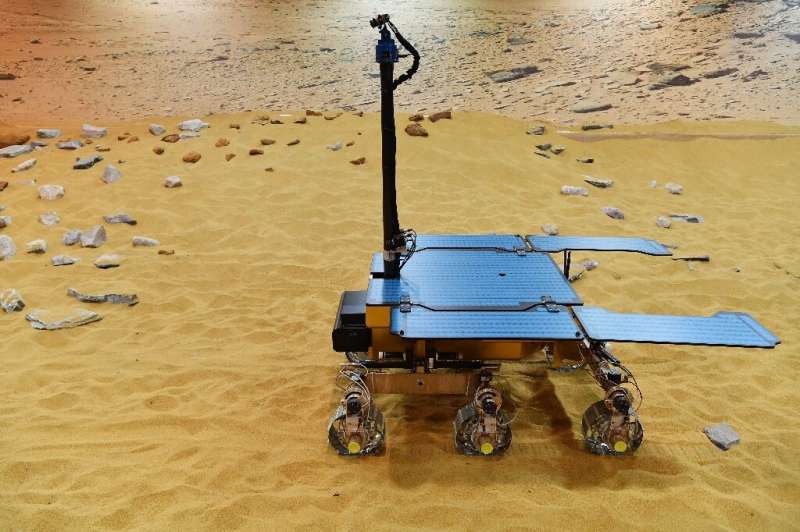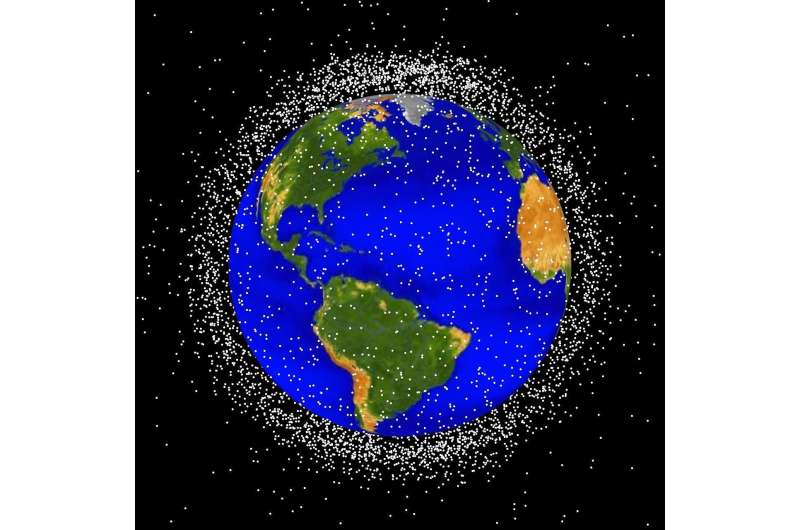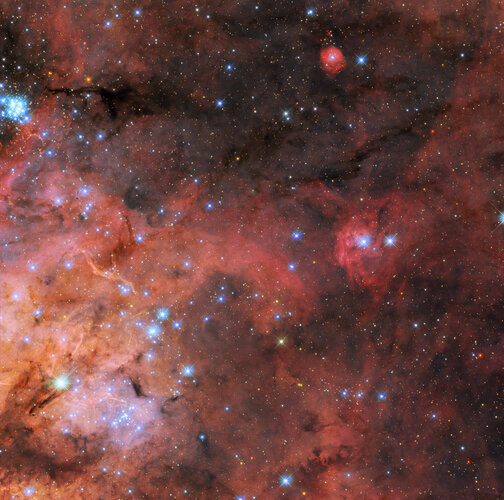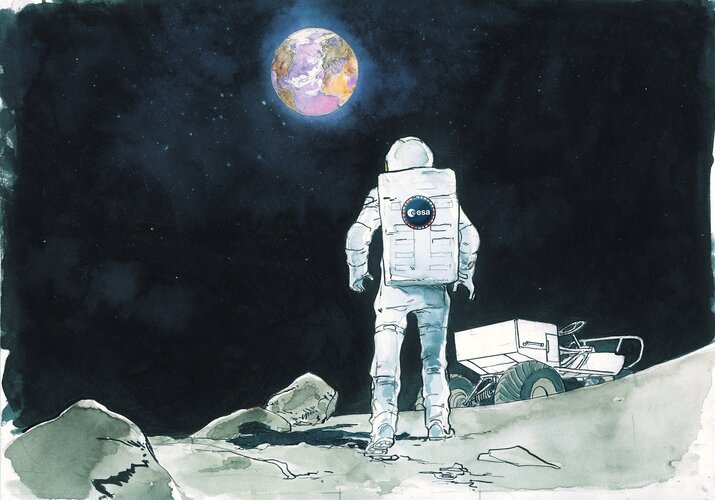Long-delayed ExoMars mission still dreams of 2028 launch
Friday, 03 February 2023 17:31
War, budget cuts, a pandemic and a crash: For all its trials, Europe's ExoMars mission might be more deserving of the name Perseverance than NASA's Martian rover.
But the European Space Agency still hopes the mission can launch in 2028 on its long-delayed quest to search for extraterrestrial life on the Red Planet.
This time last year, the ESA's Rosalind Franklin rover was all ready for a September launch from the Baikonur Cosmodrome in Kazakhstan, planning to catch a ride on a Russian rocket and descend to the Martian surface on a Russian lander.
Then Moscow invaded Ukraine in March, and sanctions imposed by the ESA's 22 member states led to Russia pulling out and the mission being suspended.
France pledges not to conduct anti-satellite missile tests but leaves other options open
Friday, 03 February 2023 15:54
Driven by concerns over space debris, in late November the French Ministry for the Armed Forces formally committed not to conduct anti-satellite missile tests. And yet, France's space strategy of 2019 resolved to "toughen" the country's space capabilities.
Given the short lapse of just three years, how can we make sense of France's seemingly contradictory space military policy?
A historic but surprising decision?
In October 2022, the United Nations voted to work towards putting an end to "destructive direct-ascent antisatellite missile testing"—that is, missiles fired at satellites from Earth's surface or from the air. France cosponsored the resolution and voted for it, despite possessing the technical expertise required to develop such a capacity.
The ministry's statement, published on 9 November 2022, is strongly worded. It dubs anti-satellite testing as "destabilizing and irresponsible," and insists France never conducted such tests. It also voices concerns about the potential impact of space debris on the integrity of in-use satellites, as well as for the space domain. France's decision follows that of the United States on 9 April 2022, which the Elysée Palace had then applauded.
Week in images: 30 January - 03 February 2023
Friday, 03 February 2023 13:13
Week in images: 30 January - 03 February 2023
Discover our week through the lens
Former ILS president hired as new Spaceflight CEO
Friday, 03 February 2023 11:55
Space transportation services provider Spaceflight Inc. has hired the former president of International Launch Services as its new chief executive.
The post Former ILS president hired as new Spaceflight CEO appeared first on SpaceNews.
Earth from Space: Kolkata, India
Friday, 03 February 2023 08:00 Image:
Kolkata, formerly Calcutta, is featured in this image, captured by the Copernicus Sentinel-2 mission.
Image:
Kolkata, formerly Calcutta, is featured in this image, captured by the Copernicus Sentinel-2 mission. Exploring a turbulent tarantula
Friday, 03 February 2023 07:58 Image:
Exploring a turbulent tarantula
Image:
Exploring a turbulent tarantula First step toward predicting lifespan of electric space propulsion systems
Friday, 03 February 2023 04:56 Electric space propulsion systems use energized atoms to generate thrust. The high-speed beams of ions bump against the graphite surfaces of the thruster, eroding them a little more with each hit, and are the systems' primary lifetime-limiting factor. When ion thrusters are ground tested in an enclosed chamber, the ricocheting particles of carbon from the graphite chamber walls can also redeposi
Electric space propulsion systems use energized atoms to generate thrust. The high-speed beams of ions bump against the graphite surfaces of the thruster, eroding them a little more with each hit, and are the systems' primary lifetime-limiting factor. When ion thrusters are ground tested in an enclosed chamber, the ricocheting particles of carbon from the graphite chamber walls can also redeposi The bubbling universe: A previously unknown phase transition in the early universe
Friday, 03 February 2023 04:56 Think of bringing a pot of water to the boil: As the temperature reaches the boiling point, bubbles form in the water, burst and evaporate as the water boils. This continues until there is no more water changing phase from liquid to steam.
This is roughly the idea of what happened in the very early universe, right after the Big Bang, 13.7 billion years ago.
The idea comes from partic
Think of bringing a pot of water to the boil: As the temperature reaches the boiling point, bubbles form in the water, burst and evaporate as the water boils. This continues until there is no more water changing phase from liquid to steam.
This is roughly the idea of what happened in the very early universe, right after the Big Bang, 13.7 billion years ago.
The idea comes from partic Astronauts use spacewalk to continue upgrade of ISS solar arrays
Friday, 03 February 2023 04:56 Astronauts from NASA and Japan Aerospace Exploration Agency stepped out from the International Station to begin a spacewalk early Thursday to complete work started by another work team almost two weeks ago - part of a project to upgrade the station's power generation systems.
NASA's Nicole Mann and JAXA's Koichi Wakata were tasked with finishing work on a mounting platform on one of th
Astronauts from NASA and Japan Aerospace Exploration Agency stepped out from the International Station to begin a spacewalk early Thursday to complete work started by another work team almost two weeks ago - part of a project to upgrade the station's power generation systems.
NASA's Nicole Mann and JAXA's Koichi Wakata were tasked with finishing work on a mounting platform on one of th For the First Time Hubble Directly Measures Mass of a Lone White Dwarf
Friday, 03 February 2023 04:56 Astronomers using NASA's Hubble Space Telescope have for the first time directly measured the mass of a single, isolated white dwarf - the surviving core of a burned-out, Sun-like star.
Researchers found that the white dwarf is 56 percent the mass of our Sun. This agrees with earlier theoretical predictions of the white dwarf's mass and corroborates current theories of how white dwarfs evo
Astronomers using NASA's Hubble Space Telescope have for the first time directly measured the mass of a single, isolated white dwarf - the surviving core of a burned-out, Sun-like star.
Researchers found that the white dwarf is 56 percent the mass of our Sun. This agrees with earlier theoretical predictions of the white dwarf's mass and corroborates current theories of how white dwarfs evo Too hot and too cold; now Moon it could be just right for humans
Friday, 03 February 2023 04:56 With temperatures on the moon ranging from minus 410 to a scorching 250 degrees Fahrenheit, it's an understatement to say that humans will need habitats with heat and air conditioning to survive there long term.
But heating and cooling systems won't be effective enough to support habitats for lunar exploration or even longer trips to Mars without an understanding of what reduced gravity do
With temperatures on the moon ranging from minus 410 to a scorching 250 degrees Fahrenheit, it's an understatement to say that humans will need habitats with heat and air conditioning to survive there long term.
But heating and cooling systems won't be effective enough to support habitats for lunar exploration or even longer trips to Mars without an understanding of what reduced gravity do Spacemind launches three Italian Nanosatellites into orbit
Friday, 03 February 2023 04:56 Spacemind, the space division of Italian company NPC, has achieved great success with a series of space launches. The three Italian nanosatellites, DanteSat, Futura-SM1, and Futura-SM3, have been successfully launched into orbit. This has also validated the operation of the new SMPod cubesat deployer, on-board equipments, and a larger version of the Artica deorbiting sail.
Nicolo Benini, M
Spacemind, the space division of Italian company NPC, has achieved great success with a series of space launches. The three Italian nanosatellites, DanteSat, Futura-SM1, and Futura-SM3, have been successfully launched into orbit. This has also validated the operation of the new SMPod cubesat deployer, on-board equipments, and a larger version of the Artica deorbiting sail.
Nicolo Benini, M Researchers devise a new path toward 'quantum light'
Friday, 03 February 2023 04:56 Researchers have theorised a new mechanism to generate high-energy 'quantum light', which could be used to investigate new properties of matter at the atomic scale.
The researchers, from the University of Cambridge, along with colleagues from the US, Israel and Austria, developed a theory describing a new state of light, which has controllable quantum properties over a broad range of frequ
Researchers have theorised a new mechanism to generate high-energy 'quantum light', which could be used to investigate new properties of matter at the atomic scale.
The researchers, from the University of Cambridge, along with colleagues from the US, Israel and Austria, developed a theory describing a new state of light, which has controllable quantum properties over a broad range of frequ TAU establishes the first satellite observatory for quantum optical communication
Friday, 03 February 2023 04:56 The Center for Quantum Science and Technology at Tel Aviv University has built the first ground station in Israel - and among the most advanced in the world - for tracking, sensing, hyperspectral imaging, and optical and quantum communication with satellites in orbit around the Earth. The station includes a satellite observatory dome with a diameter of 4.25 meters, a tracking system, a primary h
The Center for Quantum Science and Technology at Tel Aviv University has built the first ground station in Israel - and among the most advanced in the world - for tracking, sensing, hyperspectral imaging, and optical and quantum communication with satellites in orbit around the Earth. The station includes a satellite observatory dome with a diameter of 4.25 meters, a tracking system, a primary h 

